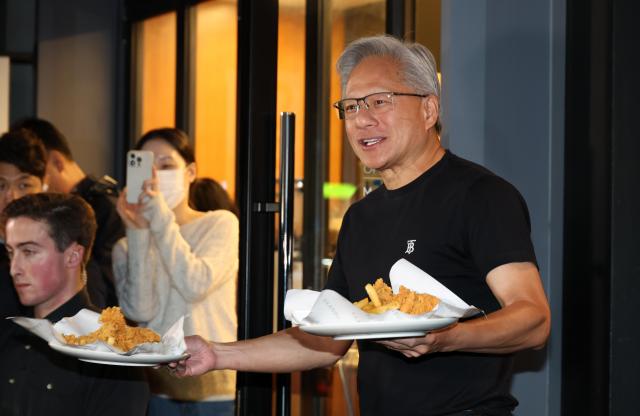
SEOUL, November 24 (AJP) - Fried chicken – not kimchi – is the foreign favorite Korean food, which explains Nvidia CEO Jensen Huang’s choice of dining out with his Korean tycoon friends – Lee Jae-yong of Samsung Electronics and Chung Euisun of Hyundai Motor – last month.
Nearly three out of 10 foreigners, or 28.3 percent, named Korean fried chicken as the most Korean menu they had eaten over the past year, according to a poll of 11,000 respondents across 22 cities worldwide conducted by the Ministry of Agriculture, Food and Rural Affairs and the Korean Food Promotion Institute and released on Monday.
Staple cabbage dish kimchi closely trailed at 28 percent, followed by bibimbap at 19.9 percent, ramyeon at 16.6 percent, and bulgogi at 14 percent.
The same menu topped first-choice preferences for Korean dishes at 14 percent — well ahead of kimchi (9.5 percent), bibimbap (8.2 percent), and bulgogi (5.8 percent).
Korean fried chicken has recently drawn global attention after Huang’s chimaek (a Korean combination of fried chicken and beer) night-out at a branch of “Kkanbu Chicken” in Seoul during his trip last month for APEC week.
Shares of Kyochon F&B — Korea’s only listed fried chicken franchise — jumped as much as 23.31 percent in early trading to 4,900 won ($3.32) following the news. The company posted a third-quarter operating profit of 11.3 billion won, up 47.2 percent from a year earlier, with revenue rising 6 percent to 135.2 billion won. Net profit surged 68.9 percent to 7.6 billion won.
Overall satisfaction with Korean cuisine remained high, with 94.2 percent of respondents who had tried Korean food saying they were satisfied. The share of consumers willing to try Korean food again surpassed 80 percent for the first time, rising 4.5 percentage points from last year to 80.6 percent.
The survey also found that Korean cultural content continues to play a major role in boosting interest in Korean cuisine. With the global success of Netflix's animated film “KPop Demon Hunters” this year, 65.1 percent of respondents said Hallyu content initially drew them to Korean food.
Based on the findings, the ministry plans to strengthen regional marketing, support overseas Korean restaurants, and expand collaborations linking Korean food with cultural content and ready-to-eat products.
“We will expand the designation of outstanding overseas Korean restaurants and tailor promotion strategies to local consumer trends to elevate the global standing of Korean cuisine,” said Jeong Kyung-seok, director-general for food industry policy at the ministry.
Copyright ⓒ Aju Press All rights reserved.


![[CES 2026] NVIDIA CEO Jensen Huang delivers keynote speech](https://image.ajunews.com/content/image/2026/01/06/20260106105551777607_278_163.jpg)

![[CES 2026] Nvidias Jensen Huang, AMDs Lisa Su to outline AI strategies](https://image.ajunews.com/content/image/2026/01/05/20260105074115590653_278_163.jpg)